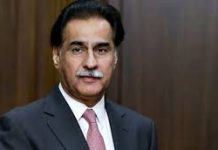LAHORE: Pakistan Tehreek-e-Insaf (PTI) leader and former special assistant to the prime minister Mirza Shahzad Akbar has challenged a trial court’s decision in the Lahore High Court pertaining to the initia-tion of proceedings against him, in a case where the former prime minister Shehbaz Sharif and others had been acquitted from alleged Rs25 billion money laundering charges in the Ramzan and Al-Arabia Sugar Mills case.
In his petition, filed through advocate M. Haroon Ilyas, Akbar asserted that the court without applying judicial mind discharged the accused persons merely relying upon its own assumptions which was purely contrary to the law.
He sought the Lahore High Court’s (LHC) intervention to set aside the court’s order it had passed on July 10, 2023, and direct the concerned quarters to take action against the petitioner for allegedly launching false prosecution against the respondents Shehbaz Sharif and Suleman Shehbaz.
He also urged the LHC to quash certain observations deemed detrimental to his reputation, personal life and legal career. Akbar asserted that the initiation of inquiry and subsequent investigation was not influenced by him but rather a result of a directive from the federal cabinet.
He submitted that the then federal cabinet had instructed the Federal Investigation Agency (FIA) to initiate action based on the report of the sugar inquiry commission.
“The direction given in the impugned order against the petitioner lacks substance and is without a proper basis which needs to be set aside,” he added.
The petition stated that the trial court’s observation which contradicts the findings of the higher court, is flawed and without basis. The observation made by the trial court without examining any witnesses is seen as incorrect and is being challenged through the revision petition, which needs to be set aside, it added.
The petition further contends that the trial court’s observations contradict findings from higher courts and were made without examining any witnesses.
He also highlighted the trial court’s approach which he believes is beyond the purview of a trial court which is a statutory court and not a constitutional court.
“The deviation from established legal principles, according to the petitioner, indicates an ambitious attempt by the trial court to pave the way for an acquittal order”, he maintained.
Akbar highlighted an unprecedented approach taken by the trial court during the hearing of applica-tions under Section 265-K of the Cr.P.C. In this instance, the court independently formulated 27 ques-tions, seeking answers from the media, the public, and even the Federal Investigation Agency (FIA). Many of these questions, focusing on revenue matters related to the sugar business, were not part of the original charge sheet filed by the investigation agency.
Despite this, the trial court proceeded to solicit answers from the agency, a move that Akbar argues violated legal procedures governing the framing of charges and falls outside the scope of a trial court’s authority.
Despite the provision of a list of 100 witnesses in the investigation report submitted under section 173 of the Cr. P.C., the trial court did not call these witnesses for examination.
Akbar further mentioned the presence of financial analysts who prepared a report detailing over 15,000 transactions involving unnamed accounts, totalling Rs16 billion.
Despite this evidence, the trial court discharged the accused individuals based on its assumptions, a move Akbar contends is contrary to the law. –Agencies



